
Emerging Economies: Transparency and Accountability in the Extractive Industries Working Paper Series
Emerging economies, their governments and their companies, are playing an increased role in oil, gas and mining production - both within their own borders but also outside in other countries and regions.
With the potential to bring powerful positive or negative impacts, it is vital that decision makers in these companies and governments are accountable for their actions, at home and abroad. Clearly, some existing national and international initiatives towards transparency and accountability will also affect these emerging economy actors. But are there other opportunities and challenges specific to these actors? How can real dialogue be developed with each of them?
To increase our collective understanding, the Transparency and Accountability Initiative and Revenue Watch Institute have commissioned a series of country scoping studies with researchers in Brazil, China, India, Mexico, Russia, the Philippines and South Africa. At the country level, they have mapped trends, key actors, and promising strategies for engagement on the domestic front. At the international level, they have explored the potential for developing dialogue in global policies and initiatives.
Learn more about the Transparency & Accountability Initiative at http://www.transparency-initiative.org/.
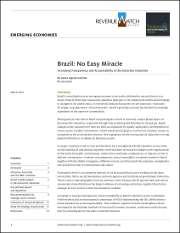 |
Brazil: No Easy Miracle By: Carlos Aguilar Sánchez The future of these resource-rich countries no longer rests mainly on foreign aid but on the extent and effective use of the country’s own resources and how they use them. For that to occur, a focused and concrete approach to improve governance and accountability is critical. Reshaping the fight against corruption into a smarter strategy that integrates the challenge of improving governance and institutions in both the public and private sphere is the way forward. English | Portuguese |
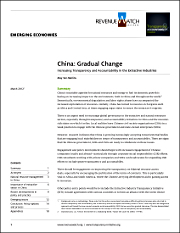 |
China: Gradual Change By: May Tan-Mullins China’s voracious appetite for domestic growth has been fueled by natural resources, both within its borders and in other countries. However, this need to succeed has taken its toll on the environment and its population, and there is an urgency to help the nation understand the effects of extraction and instill good governance within the sector. English | Chinese |
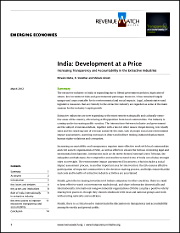 |
India: Development at a Price By: Ritwick Dutta, R. Sreedhar and Shibani Ghosh India’s extractive industry is rapidly growing but in the country’s most remote and culturally sensitive regions. Often faced with public opposition due to its opaque nature and refusal to own up to its social and environmental impacts, the industry is now under public scrutiny. Starting at the local level, reform is under way to bring more transparency and better governance overall. English | Hindi |
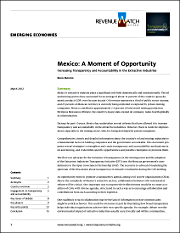 |
Mexico: A Moment of Opportunity By: Rocio Moreno Mexico’s extractive industry plays a large role in both the country’s domestic and international affairs. While the nation has made a conscious effort to bring transparency and accountability to the sector over the last 10 years, more needs to be done starting with the adoption of the EITI and better access to information. English | Spanish |
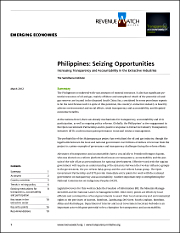 |
Philippines: Seizing Opportunity By: Edna Maguidad, Ingrid Gorre and Christine Antoniette Though the Philippines is endowed with an abundance of minerals, the country’s extractive industry is laden with adverse social and environmental effects, weak transparency and accountability and minimal economic benefits. The country’s first steps toward good governance are securing political will and developing a better relationship between the local and national governments. English |
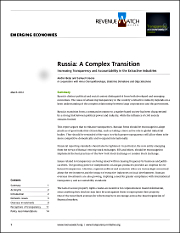 |
Russia: A Complex Transition By: Andrei Belyi and Samuel Greene, in cooperation with Anna Chernyakhovskaya, Ekaterina Demakova and Olga Selezneva Due to its social and political situation, Russia is a completely different kind of beast therefore advancing transparency in the extractive sector requires a keen understanding of the government’s relationship with big business and the country’s operations at home and abroad. English | Russian |
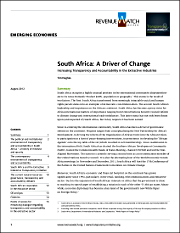 |
South Africa: A Driver of Change By: Tim Hughes South Africa is not only a good representative of Africa’s evolution in the international arena but also a highly significant player in the extractive sector across the continent. Despite how far it has come, the nation still has a long way to go in the fight for transparency and accountability due to its closed, exclusory and nationalist modern history. English |